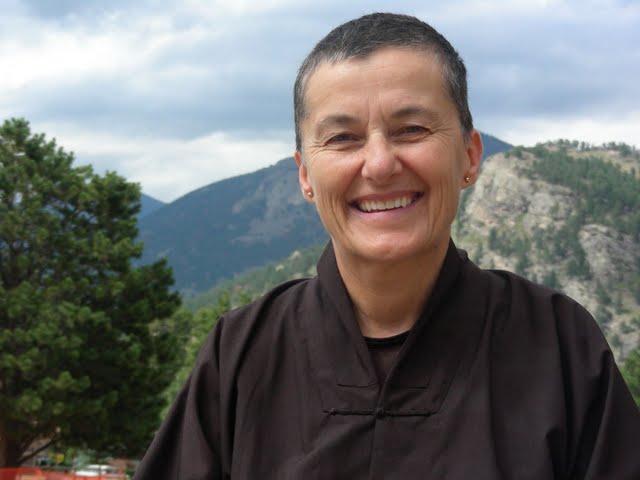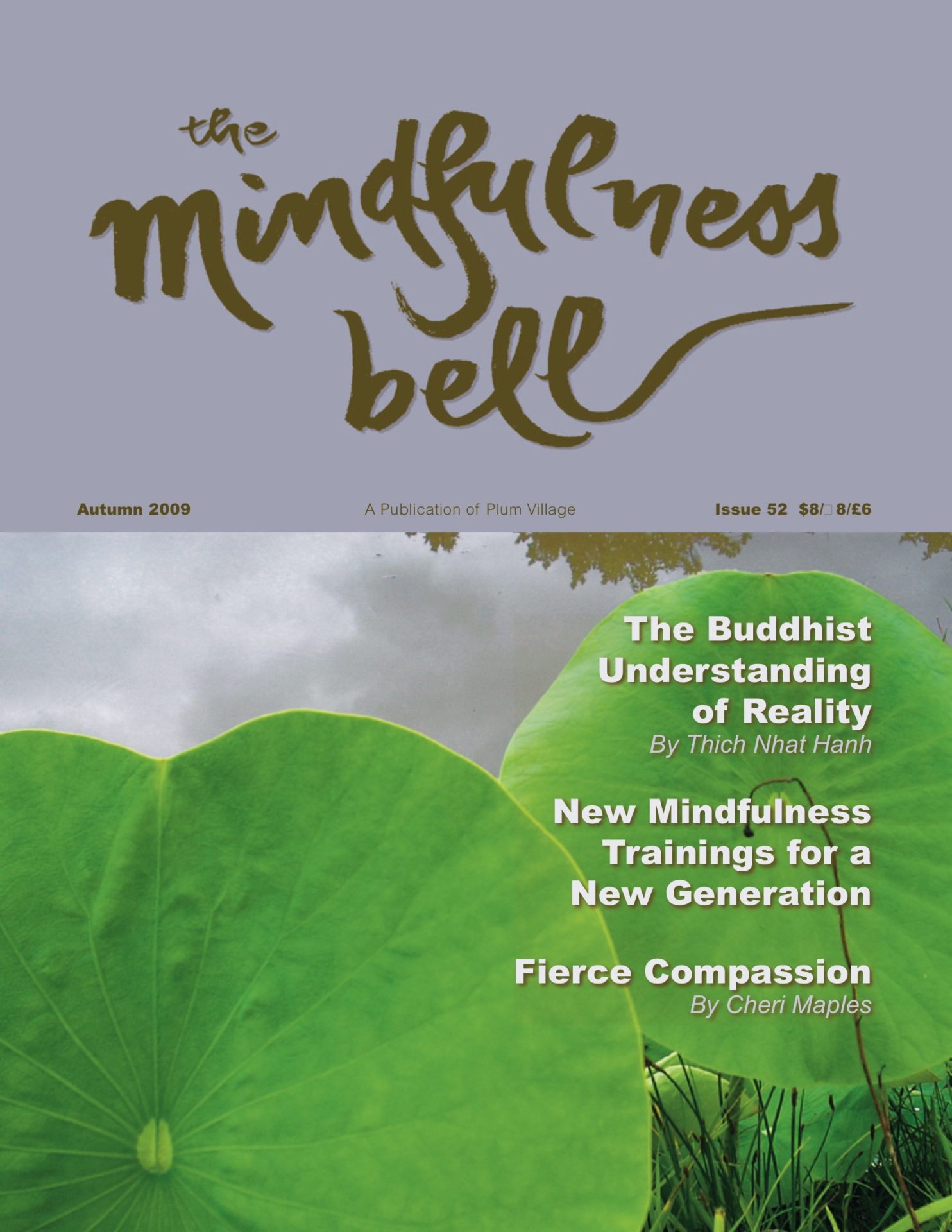By Cheri Maples

Cheri Maples received the Lamp Transmission from Thich Nhat Hanh and became a Dharma teacher on January 9, 2008 at Plum Village. Here is part of the Dharma talk she gave to the Sangha that day.
Since I was very young, I have had a passion for justice, which led to my work as a police officer and my work in other parts of the criminal justice system.
By Cheri Maples

Cheri Maples received the Lamp Transmission from Thich Nhat Hanh and became a Dharma teacher on January 9, 2008 at Plum Village. Here is part of the Dharma talk she gave to the Sangha that day.
Since I was very young, I have had a passion for justice, which led to my work as a police officer and my work in other parts of the criminal justice system. However, I began working for social justice, not from a peaceful place, but from the place of an angry rebel. Looking back, I realize that fighting for social justice in various forms was one of the fuels I used to keep the unconscious habit seeds of anger burning strongly. As a result, the unskillful behaviors I engaged in created some harm in my personal and work relationships.
I attended my first retreat with Thay in 1991. That retreat started the beginning of the mindfulness journey I have been on ever since. I have lots of habit energy and karma to transform, so this lifelong journey, while not a speedy one, has been and will continue to be a journey characterized by constancy and right aspiration.
For me, the path of mindfulness continues to be about waking up to the mystery that is right here in the present moment. Although there continue to be painful experiences and cycles in my life, I get increasingly frequent and reassuring glimpses of my vastness and my interconnection with everybody and everything in the universe.
As my practice has progressed, I have begun to understand that working for peace and justice is a journey of gentle honesty and a process of learning how to be present so that every interaction with another person is an opportunity for authenticity and understanding.
I was such an unlikely candidate for this path that I consider finding my way to it nothing short of a miracle. Today, I would like to share with you some of the most important things I have internalized about Thay’s teachings.
Suffering as Compost
First, I have learned that our personal suffering is the richest compost of our practice.
I experienced much pain in my relationship to my parents as a child, in my relationship to my children as a parent, and in my other intimate relationships. I have learned how to use this pain to understand more about what it is to be human.
I now understand that blame has often been a barrier I erected not to take responsibility for my own emotions. As I learn more about how to understand and frame my own suffering, I continue to see my own preciousness and that of others. I have learned that imperfection is not a thing to be avoided or blamed on others and that the very things that make me feel so very unlovable, all those defects I tried so hard to hide, are precisely what I have to offer others.
I have learned to remind myself that I need to stop relating to what I would like to fix in myself and replace the seeds of project mentality with loving kindness and unconditional friendship with myself and others. It’s helpful to remember that what I am doing is unlocking a softness that is in me and letting it spread in order to soften the sharp edges of self-criticism and complaint.
The Path of True Redemption
Second, I have learned that the truth is many-sided and can be approached from multiple perspectives, and that it is important to develop a deep sense of openness.
I see multiple doors to the Dharma around me every day and understand that different people enter through different doors. To me, any door that helps people lead a more ethical and compassionate life is a legitimate Dharma door. My challenge as a Dharma teacher is to find and invite people through the Dharma doors that they can relate to by translating Thay’s teachings into a language they can understand. Of course, a major focus of mine will be bringing Thay’s teachings to those who work in the criminal justice system because I understand not only their language and fears, but also the injustices committed when people abuse the trust and state authority bestowed upon them.
I hope I can help people to understand the difference between fear and faith, between doing the right thing and righteousness, between action and compulsion. I hope I can help them internalize Thay’s teaching that when we stop seeing ourselves solely as victims or oppressors, we can develop a sense of forgiveness for ourselves and others that leads to true redemption. And, in finding their way, I hope I can encourage people to think enough of themselves to claim the right to question what is offered, to investigate what they are being told, to trust their own experiences, and allow others to do the same.
In finding my own middle way between action and compulsion, I try to remind myself that although my spiritual practice requires me to take action, it should not be one more thing to judge myself about or be compulsive about. In every major step along my own path, first in receiving the Five Mindfulness Trainings, then in receiving the Fourteen Mindfulness Trainings, and now being made a Dharma teacher, I have gone through what I call an “I’m not worthy crisis.” When I really get scared that I am not worthy, my partner will say to me, “Do you trust Thay?” I say, “Of course. I trust Thay with all my heart.” She says, ”Then, trust him not to make a mistake. Get out of the way and let the Buddha be the Dharma teacher.”
I do trust that the process of becoming a Dharma teacher will work in a similar manner as the process of receiving the Five and Fourteen Mindfulness Trainings. The trainings and the possibilities contained within the trainings work on me as I work on them. As my understanding and practice deepens, old habit seeds and energies are transformed as new seeds get watered by living up to the possibilities of the path.
So I have decided that the purpose of being a Dharma teacher is no different than the purpose of any student on the path. The purpose is not to do it right but to reside in the joy and possibilities provided by the opportunity to commit more deeply to the Dharma and reap the bountiful harvest that this possibility offers.
In finding my way between fear and faith, I have learned that faith is about discovering the existence of an ultimate dimension and learning to live with heart. Discovering fearlessness comes from working with the softness of the human heart and letting the world tickle your heart with the wonders of the present moment and your relationships with others. It comes from being willing to open up, touching your own vulnerability, and having the courage to share your heart with others. This is the path to the authentic relationships that are the litmus test of spirituality.
In discovering the difference between doing the right thing and righteousness, I have learned that dogma and righteousness are subtle forms of violence. In contrast, faith enables us to meet life with a sense of curiosity rather than a definition of reality.
One of Thay’s greatest gifts to me was the teaching that if we truly understand our interconnection with others, we can all find a victim and an oppressor within ourselves. I can look back and find painful examples of my own mistakes and unintentional abuses of power. Likewise, I can find painful examples of my own victimization. When we learn to acknowledge and make friends with these parts of ourselves, it enables us not to become one or the other.
As long as we see ourselves solely as victims, our anger will fuel a dangerous sense of entitlement that can be just as destructive as the oppressor’s abuse of power. When I see all the ways that I have been a perpetrator and a victim, I can relax. I can hold more paradoxes, more dichotomies. I can also let go of my guilt about the past and understand that redemption lies in the correction of the course of my mistakes. I can continually begin anew by taking the opportunity the present moment puts in front of me to make a different choice.
An Unwavering Commitment to Non-Violence
Third, I have deeply internalized Thay’s teaching that it is impossible to end violence with violence.
I believe this is the biggest challenge and the most important lesson for all those working in the criminal justice system. Working to provide public safety means working for peace and justice, and requires an unwavering personal commitment to non-violence in our own lives and in our environments and systems. This requires a personal aspiration not to contribute to violence or aggression in any form. If the personal is indeed political, the most radical political act of all is to learn how to live in more harmony with everyone and everything.
When we understand our interdependence deeply, we understand that when we care for ourselves, we care for others; and when we care for others, we care for ourselves. This understanding enables us to effectively work for peace in ourselves, our communities, and our world.
Unfortunately, I work in a criminal justice system based on the premise that punishment of the perpetrator will heal the victim and rehabilitate the perpetrator. Of course, people insistent on punishing each other usually become allied in making each other suffer more.
I have observed that it is not the wrongdoer’s repentance that creates forgiveness, but the victim’s forgiveness that creates repentance. This is where forgiveness enters the realm of spirit and paradox. Because it becomes a mysterious gift offered to one who does not necessarily merit it, it becomes the essence of compassion itself.
In conclusion, my own path has taught me how important it is to be present to my own life, to trust myself and help others to do the same, to allow my heart to be torn open in love rather than protected in fear. I have learned to keep asking myself if what I am doing is making me kinder, more understanding, and more loving.
Cheri Maples, True Jewel, worked in the criminal justice profession for twenty-five years; she is also a licensed attorney and clinical social worker, and co-founder of the Center for Mindfulness and Justice. Cheri practices with SnowFlower Sangha in Madison, Wisconsin.

